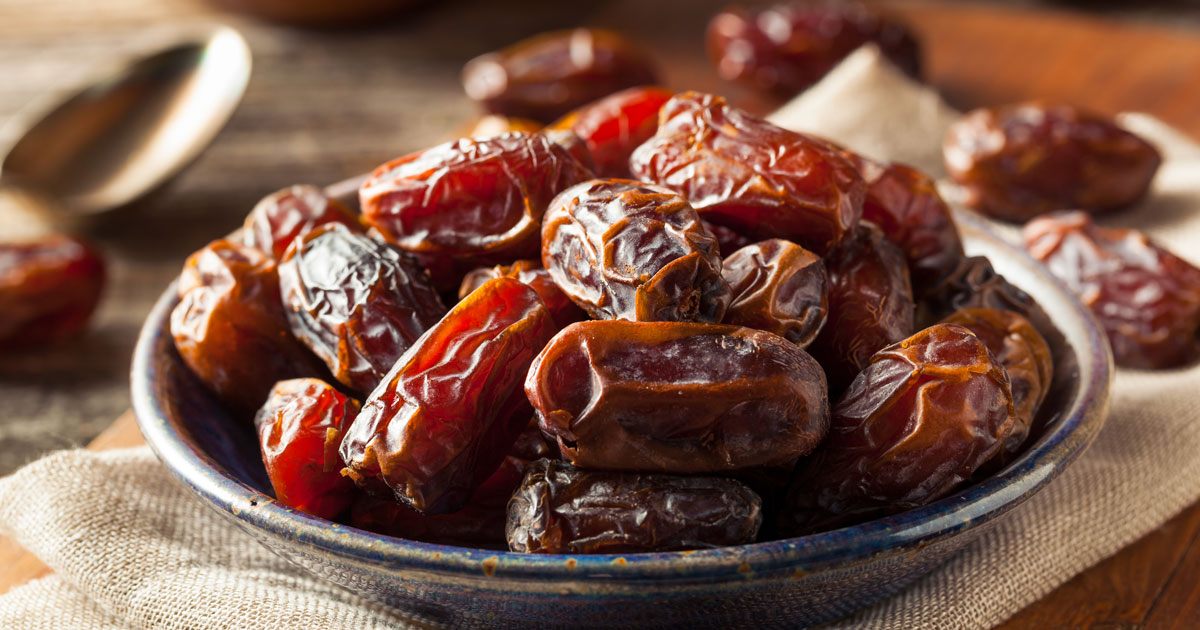
The date is an ancient fruit that has been prized and valued by different cultures for many thousands of years. Yet what was once viewed as an indulgent luxury in some places is now available all over the world. Dates are almost always sold after going through a drying process, and the end result is a chewy, sumptuous delight with a rich sweetness and caramel-like flavor. What might surprise most people, however, is that dates are also loaded with nutrients that provide a wide range of health benefits.
Dates are the fruit of the date palm tree (Phoenix dactylifera), a flowering tree in the Arecaceae palm family. Date palms have been cultivated since ancient times, having originally been grown in the Fertile Crescent between Mesopotamia and Egypt. Today, date palms are cultivated all over the Middle East, North Africa, and many other places around the world that have arid climates. Throughout history, people have used the fruit for food and virtually every other part of the tree for some purpose.
While fresh dates are an option, most people consume dates that have been allowed to dry somewhat on the tree or that have gone through a commercial drying process. They can then be eaten whole, pitted and then stuffed, or chopped and used as a sweetener or an addition to other food products like smoothies or baked goods. The two most common cultivars are deglet noor dates from Algeria and medjool dates from Morocco, and they are both used extensively in North African cuisine.
Like figs and other types of fruit that are traditionally dried, dates are rich in nutrients as well as calories. One 3.5 ounce serving of dried dates has about 280 calories, 75 grams of carbohydrates, 2.4 grams of protein, and 0.4 grams of fat. Of the carbohydrate content, some (about 8 grams) is fiber, but most of the rest is natural sugar, split evenly between glucose and fructose. Below are additional nutritional facts about dates:
Vitamins (% Daily Value)
Minerals (% Daily Value)
So even though dates are relatively high in calories compared to other fruits, they contain many nutrients that are necessary for basic human health. Yet dates are also good sources of antioxidants, compounds that protect against damage from free radicals. Free radicals are the natural result of the regular chemical reactions that happen in our cells every day, but we need sources of antioxidants from the food we eat to counteract the effect. In dates, the antioxidants mostly come in the form of carotenoids and polyphenols like flavonoids and phenolic acid.
Because of the number of calories and sugar content, it may be surprising that dates can be considered a healthy food. The truth is that these nutrient and energy-dense fruits have long been a beneficial part of human diets because they are a good source of vitamins and minerals our bodies need every day. But these nutrients are also known to provide a variety of other health benefits as well:
Dried dates are a versatile ingredient that can be used in many different applications like baked goods, granola, protein bars, and shake mixes. At FruitSmart, our low moisture powders, dices, and pieces make for high quality, all-natural ingredients that can add flavor and nutritional value to any recipe. If you’d like to learn more about any of our products or what it’s like to partner with FruitSmart, please contact us today.
